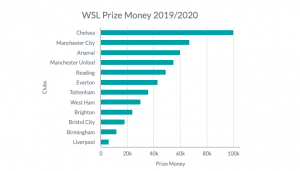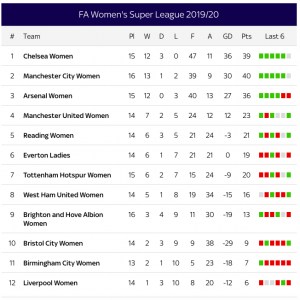Women’s Super League faces uncertain financial future post-pandemic
A study published in late 2019 says that women’s football in the UK had seen a 60 percent growth in fans since 2017.
Before the coronavirus pandemic, Women’s Super League (WSL) teams were breaking crowd records and attracting new fans.
The Football Association’s (FA) inaugural women’s football weekend in November saw over 70,000 fans attend six matches, numbers which had never previously been seen in the UK.
That was all before the season was cancelled due to Covid-19.
The WSL season was officially ended in May and the final standings were decided on a points per game system.
The financial impact of the pandemic is starting to show all over the world and women’s football faces significant challenges ahead.
According to Swiss Ramble, WSL teams have seen an £8.7m loss across the division since the 2018/2019 season.
This is not abnormal, as most WSL teams operate at a loss while their parent companies cover any shortfalls.
However, with parent companies also facing challenges due to the economic effects of the pandemic, it remains to be seen how the WSL teams will be able to bounce back when their new season begins.
Women’s football has relied so heavily on the fan experience at their matches, and on building up crowds over the past few years in order to generate revenue.
With the uncertainty surrounding when fans will be allowed back in stadiums, the WSL will have to turn to different avenues for revenue.
Broadcast rights for the WSL are held by BT Sport and the BBC, however, both cover their own costs of covering the game, instead of paying the league for the rights.
This is in contrast to the Premier League whose TV rights are extremely competitive and earn the teams millions of pounds per year.
Prize Money
Chelsea were awarded the title after the season was cancelled and received £100,000 in prize money.
This is striking in comparison to the prize money that is handed out in the Premier League.

In 2018/2019, Forbes confirmed that the 20 clubs in the Premier League received a payout of £2.46billion.
When Manchester City won the Premier League last year, the club received £150million. It has yet to be confirmed how much money Liverpool will walk away with after their victory this year.
According to Forbes, £1.1billion from overseas broadcasters over a three year period has significantly added to that pot.
With no payments for TV rights in the women’s game, it makes the financial situation for the WSL clubs more uncertain post-pandemic.
Teams may have to rely more on parent companies and will need to find new ways, such as increased engagement on social media, to enhance the fan experience even when crowds may not be able to attend matches.
Standings
The teams that receive the most financial support from their clubs are found at the top of the WSL table.

This very point was illustrated by the actions that Chelsea were able to take after being awarded the title.
It speaks volumes of the support that the Chelsea women have received as a team that they were able to take the £100,000 in prize money, and donate every pound of it to charity.
Chelsea had the highest expenditure in the WSL in 2019 at £4.9m, and they also brought in the highest revenue of any team at £3.3m – this was still a £1.6m operating loss from the previous year.
Despite these losses, Chelsea have proven that they are ready to continue to support their women’s team, as evidenced by their ability to donate the WSL prize money.
However, teams near the bottom of the table face significant uncertainty, threatening the status of the entire league.
It is well reported that Liverpool did not receive much support from their club, finding themselves relegated when the season was terminated.
During the previous season, according to Swiss Ramble, Liverpool had a full-time staff of only 10 people, whereas Chelsea hired 59 members of staff to support their team.
Coming out of the pandemic will be financially difficult for every team, however, those at the bottom with less support from their parent clubs will have the biggest walls to climb.
And with no word on when fans can return to stadiums, those walls are growing bigger by the day.